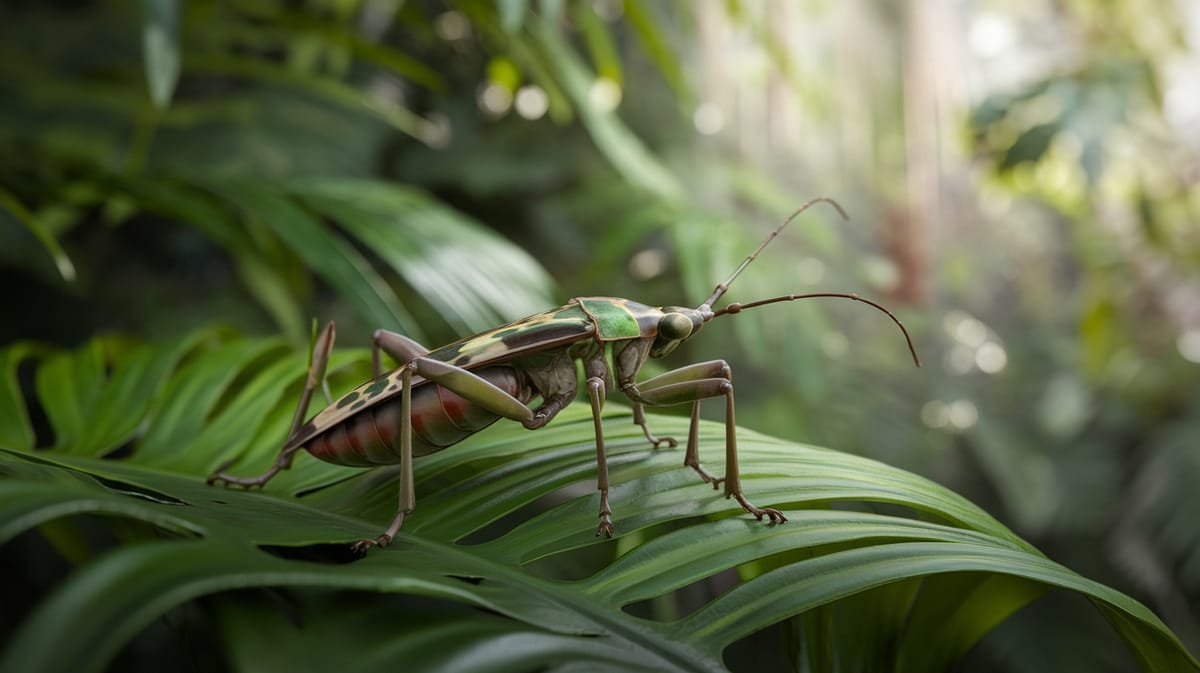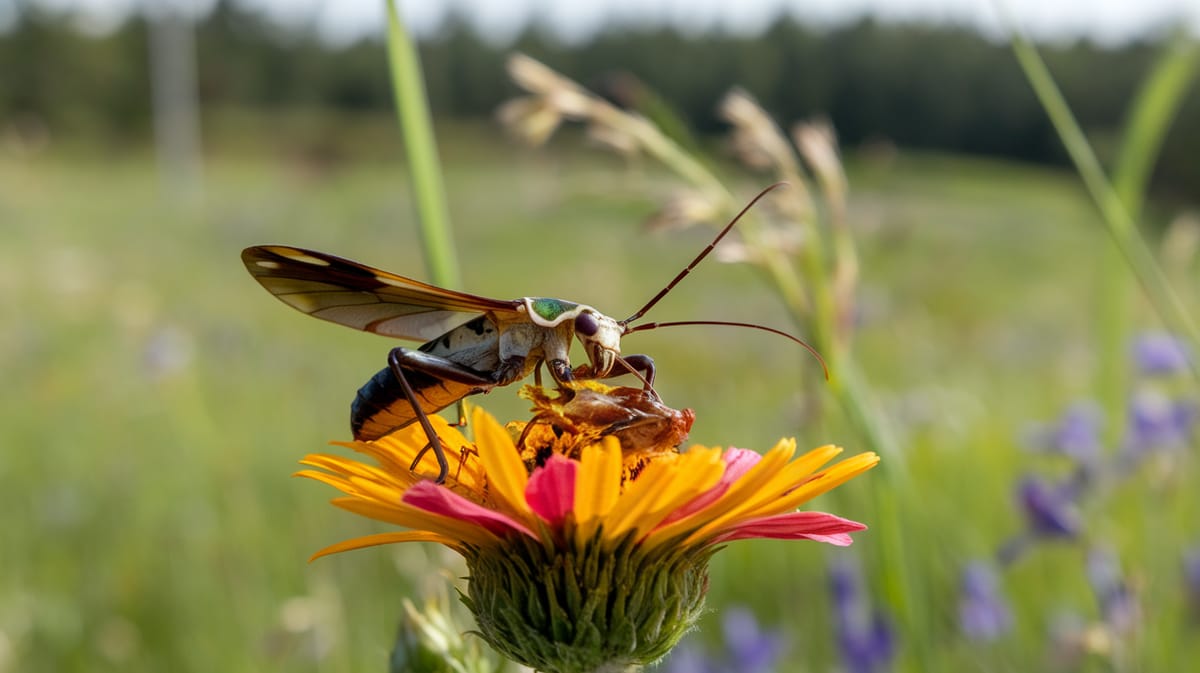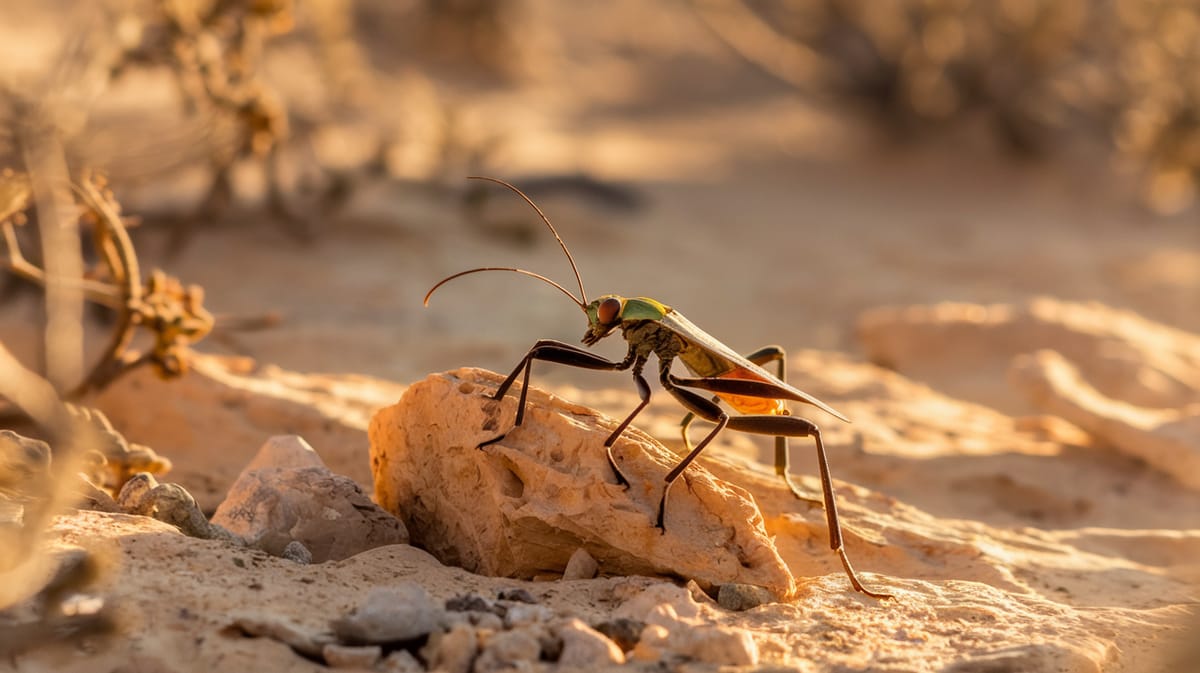Assassin Bug
Stealthy predator with piercing mouthparts, the Assassin Bug captures prey with lethal precision and plays a significant role in controlling insect populations. Known for its ambush tactics, it surprises unsuspecting victims.

Key Insights at a Glance
Did You Know?
Taxonomy & Classification
Armed with piercing mouthparts and a keen predatory instinct, Assassin Bugs exhibit complex hunting behaviors and ecological roles. Let's understand the evolutionary journey and classification of these remarkable predators.
Species Diversity
With over 7,000 species in the Reduviidae family, Assassin Bugs thrive in diverse habitats worldwide, showcasing varied hunting adaptations.
Ancient Origins
Originating over 100 million years ago, Assassin Bugs have evolved unique predatory techniques, adapting through significant climatic shifts and ecological changes.
Lifecycle and Growth
A remarkable journey of transformation from Egg to Adult.
Egg
Laid in clusters on plant surfaces, eggs are camouflaged to blend in and evade predators.
Nymph
Nymphs emerge resembling adults but lack wings, undergoing several molts to grow and develop key predatory features.
Adult
Fully developed adults possess long legs and sharp beaks, using ambush tactics to capture prey and partake in reproduction.
Dietary Habits
A skilled predator with stealthy hunting tactics, this insect primarily targets other insects, showcasing its adaptability and predatory prowess.
| DIET TYPE | DESCRIPTION |
|---|---|
| Primary Diet | Feeds mainly on soft-bodied insects like caterpillars, aphids, and beetle larvae, using its piercing mouthparts. |
| Secondary Diet | Occasionally consumes other arthropods, including spiders and small crustaceans, when typical prey is scarce. |
| Occasional | Rarely targets small vertebrates such as tiny frogs or reptiles, demonstrating opportunistic feeding in specific scenarios. |

Behaviour and Adaptations
Discover the fascinating adaptations that make the Assassin Bug a skilled predator in its environment.
Ambush Tactics
Utilizes stealth and patience to surprise unsuspecting prey.
Venomous Injection
Delivers paralyzing venom with precision to immobilize prey.
Camouflage Mastery
Blends into surroundings to evade predators and approach prey.
Ecosystem Impact
Assassin Bugs play a crucial role in ecological balance and sustainability.
Natural Pest Control
Keeps harmful insect populations in check by preying on them.
Food Web Support
Serves as prey for birds and other predators, maintaining food web dynamics.
Biodiversity Indicator
Presence indicates a healthy ecosystem with balanced insect populations.
Conservation Challenges
Addressing key threats to Assassin Bug populations for effective conservation.
Chemical Exposure
Pesticides reduce Assassin Bug populations and disrupt ecosystems.
Habitat Destruction
Urbanization and land use change lead to habitat loss for Assassin Bugs.
Climate Change
Fluctuating temperatures and weather patterns impact Assassin Bug survival.
Frequently Asked Questions
How long do Assassin Bugs live?
Assassin Bugs typically live for about one to two years, depending on environmental conditions and availability of prey. Their lifespan includes several stages from egg to adult, with each stage varying in duration based on species and habitat.
What do Assassin Bugs eat?
Assassin Bugs are predatory insects that primarily feed on other insects like flies, caterpillars, and beetles. They use their proboscis to inject venom into their prey, liquefying the insides, which they then consume.
Are Assassin Bugs poisonous?
Assassin Bugs are not poisonous to humans, but they can deliver a painful bite if handled or threatened. Their bite injects venom that is effective against their insect prey but generally causes only temporary discomfort in humans.
Are Assassin Bugs endangered?
Assassin Bugs are not considered endangered. They are widespread and found in various habitats across the world. Their populations are stable, and they play a significant role in controlling pest populations in their ecosystems.
What do Assassin Bugs symbolize?
In some cultures, Assassin Bugs symbolize strategy and patience due to their hunting techniques. They are also seen as symbols of danger and caution because of their painful bite and predatory nature.
Do Assassin Bugs bite?
Yes, Assassin Bugs can bite humans if provoked or mishandled. While their bite is not medically dangerous, it can be quite painful and may cause swelling or irritation at the site.
What color are Assassin Bugs?
Assassin Bugs come in various colors depending on the species, ranging from brown and black to bright red and orange. Their coloration often serves as camouflage or warning to potential predators.
Does an Assassin Bug have wings?
Yes, adult Assassin Bugs have wings. These wings enable them to fly, aiding in their search for prey and mates. The wings may vary in color and pattern, often depending on the specific species.
What does an Assassin Bug look like?
Assassin Bugs typically have elongated bodies, long legs, and a distinct, curved proboscis. They vary in size and color, but many are characterized by a narrow neck and a flattened, shield-like back.
Is an Assassin Bug an insect?
Yes, an Assassin Bug is an insect. It belongs to the order Hemiptera, known as true bugs, and the family Reduviidae. Insects in this family are characterized by their piercing and sucking mouthparts.
Related Insects
Discover insects with similar characteristics to Assassin Bug - including shared habitats, diets, and taxonomic classifications
Share this profile
Help others discover Assassin Bug
